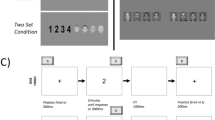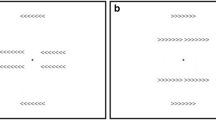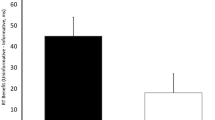Abstract
Most theorizing on the origin of the costs that are associated with task shifts focuses on local transitions between individual trials. In the present article we argue that this emphasis has resulted in a neglect of more global representational structures, which also determinate shift costs. To substantiate this claim, we employed a set of four tasks that results from a factorial combination of two types of judgment and two judgment-to-response mappings. From previous work it is known that this kind of task combination is associated with a characteristic profile of shift costs as a function of the relation between successive tasks. Previously we have interpreted this profile as an indication of a hierarchically ordered dimensional representation of the two types of judgment and the two judgment-to-response mappings. Such a representation can only be expected to emerge when the two task features, judgment and mapping, vary independently of each other within the same situation. It is shown that the characteristic shift cost profile can indeed only be observed when the performance of any of the four tasks is required in a block of trials. In contrast, with only two tasks occurring in each block of trials, shift costs do not reflect the relation between successive tasks. This finding confirms the importance of global representational structures as a determinant of shift costs beyond local transitions between individual trials.


Similar content being viewed by others
Notes
We thank Katherine Arbuthnott for directing our attention to the importance of this point.
An analysis including the response-sequence factor (repetition vs. shift) revealed the typical reversal of response-repetition benefits observed with task repetitions (79 ms) into response-repetition costs in trials with a task shift (33 ms). When we applied the model proposed by Kleinsorge et al. (2002) to the data of Phase 3, the R2 was .987.
Of course, this does not deny the role of instance-based representations of individual trials, which seem to influence performance, especially after large amounts of practice (e.g., Logan, 1988). However, in all the experiments we have conducted so far with the paradigm of the present study we have never observed a disappearance of the characteristic profile of shift costs that we interpret as indicating generalizing switches as a function of practice, although practice varied within the range of several minutes to several hours.
References
Allport, A., & Wylie, G. (2000). 'Task-switching', stimulus-response bindings and negative priming. In S. Monsell & J. Driver (Eds.), Control of Cognitive Processes: Attention and Performance XVIII. Cambridge, MA: MIT Press.
Allport, A., Styles, E., & Hsieh, S. (1994). Shifting attentional set: Exploring the dynamic control of tasks. In C. Umiltà & M. Moscovitch (Eds.), Attention and Performance XV: Conscious and Nonconscious Information Processing. Cambridge, MA: MIT Press.
Collins, A. M., & Quillian, M. R. (1969). Retrieval time from semantic memory. Journal of Verbal Learning and Verbal Behavior, 8, 240–247.
Fagot, C. (1994). Chronometric investigations of task switching. Ph.D. thesis, University of California, San Diego.
Gopher, D., Armony, L., & Greenshpan, Y. (2000). Switching tasks and attention policies. Journal of Experimental Psychology: General, 129, 308–339.
Goschke, T. (2000). Intentional reconfiguration and involuntary persistence in task-set switching. In: S. Monsell & J. Driver (Eds.), Attention and performance XVIII: Cognitive control. (pp. 331–355). Cambridge, MA: MIT Press.
Heuer, H., Schmidtke, V., & Kleinsorge, T. (2001). Implicit learning of sequences of tasks. Journal of Experimental Psychology: Learning, Memory, and Cognition, 27, 967–983.
Hommel, B., Pösse, B., & Waszak, F. (2000). Contextualization in perception and action. Psychologica Belgica, 40, 227–246.
Hübner, R., Futterer, T., & Steinhauser, M. (2001). On attentional control as a source of residual shift costs: Evidence from two-component task shifts. Journal of Experimental Psychology: Learning, Memory, and Cognition, 27, 640–653.
Kleinsorge, T. (2000). Explorations in the structure of task spaces. Psychologica Belgica, 40, 247–258.
Kleinsorge, T., & Heuer, H. (1999). Hierarchical switching in a multi-dimensional task space. Psychological Research, 62, 300–312.
Kleinsorge, T., Heuer, H., & Schmidtke, V. (2001a) Hierarchical switching in a multi-dimensional task space is not induced by specific task cues. Zeitschrift für Psychologie, 209, 105–117
Kleinsorge, T., Heuer, H., & Schmidtke, V. (2001b). Task-set reconfiguration with binary and three-valued task dimensions. Psychological Research, 65, 192–201.
Kleinsorge, T., Heuer, H., & Schmidtke, V. (2002). Processes of task-set reconfiguration: Switching operations and implementation operations. Acta Psychologica, 111, 1–28.
Logan, G. D. (1988). Toward an instance theory of automatization. Psychological Review, 95, 492–527.
Meiran, N. (1996). The reconfiguration of processing mode prior to task performance. Journal of Experimental Psychology: Learning, Memory and Cognition, 22, 1423–1442.
Meiran, N. (2000). Modeling cognitive control in task-switching. Psychological Research, 63, 234–249.
Rogers, R. D., & Monsell, S. (1995). The costs of a predictable switch between simple cognitive tasks. Journal of Experimental Psychology: General, 124, 207–231.
Schank, R. C. (1982). Dynamic Memory. Cambridge, UK: Cambridge University Press.
Acknowledgements
We thank Gerd Förster, Stefan Lapp, Carsten Sander, and Petra Wallmeyer for assistance in data analysis and running the experiment. The research reported in this paper was supported by grant Kl 1205/1-1 of the Deutsche Forschungsgemeinschaft given to the first two authors.
Author information
Authors and Affiliations
Corresponding author
Rights and permissions
About this article
Cite this article
Kleinsorge, T., Heuer, H. & Schmidtke, V. Assembling a task space: global determination of local shift costs. Psychological Research 68, 31–40 (2004). https://doi.org/10.1007/s00426-003-0134-9
Received:
Accepted:
Published:
Issue Date:
DOI: https://doi.org/10.1007/s00426-003-0134-9




